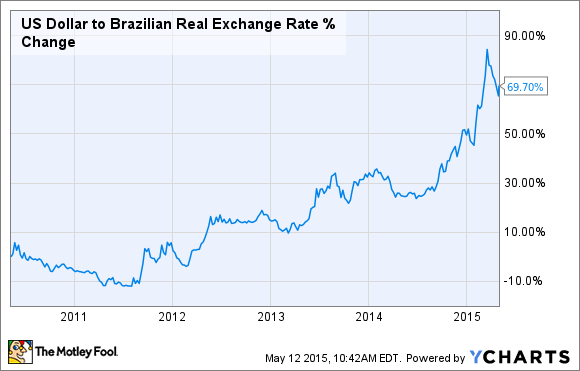One of the big themes that has happened over the past couple of quarters is how the strong U.S. dollar is adversely impacting results of U.S.-based companies that have major operations overseas. With the value of several other currencies declining in relation to the dollar, the purchase price overseas doesn't look as attractive when we translate those numbers back to American accounting.
This is not a new thing; foreign exchange has always been a risk that can sometimes work against you, or sometimes be to your benefit. For most oil investments that you and I look at, though, foreign exchange isn't as big of a deal as in other businesses. Let's take a look at what kinds of companies are affected by foreign exchange risks in the oil space, which ones are barely affected at all, and how it should influence your investing strategy.
Why foreign exchange isn't a huge deal for most
What makes oil a little bit easier to understand in terms of foreign exchange risks is that most oil trading done internationally is done in U.S. dollars. The three major international benchmark prices for oil -- Brent, Dubai/Oman, and West Texas Intermediate -- are all denominated in U.S. dollars. Since most crude is priced in dollars, it mitigates some of the risks of selling crude oil.
Another thing to consider is that most of the companies that an individual investor would look at -- companies that are on the major U.S. exchanges -- very few of them are even affected by foreign exchange at all because of the severe restrictions on crude oil exports in the U.S. Independent exploration and production companies that source their oil from the U.S., pipeline currency companies, and some independent refining companies never get exposed to currency risk because that oil or petroleum product never leaves U.S. soil. The ones that are exposed to any kind of foreign exchange risk will be the refiners that choose to export some of their products overseas or perhaps a few Canadian exploration and production companies that are listed on the U.S. exchanges.
Who's at risk?
That doesn't mean that companies in the oil space are immune to foreign exchange risks, either. The problem is, though, that you need to really know the geographic location of a company's operations and the changes in foreign exchange between those regions. Take Schlumberger (SLB 0.48%) and Halliburton (HAL 1.58%), for example. Both companies are huge players in the oil services space, but the geographic breakdown of where their revenue comes from is drastically different. Take Venezuela for example. In February the country devalued its currency by 70%. As a result, Schlumberger has recorded pretax losses over the past two quarters totaling $522 million, whereas Halliburton's loss from the currency devaluation over that time period is a more modest $199 million.
A company that is at the greatest risk to foreign exchange issues in the oil space today will be companies that have a majority of their revenue coming from a foreign country, but their debt denominated in U.S. dollars. We're looking at you, Petrobras (PBR -0.89%). On top of being the most heavily indebted oil company on the market with $325 billion in long-term debt -- by contrast, Exxonmobil (XOM -0.11%) total debt outstanding is one-tenth that size -- more than 60% of the company's debt is denominated in U.S. dollars. However, the majority of the companies' sales comes in the form or Brazilian Real since its primary role as the Brazilian national oil company is to produce and refine oil for domestic consumption.
Over the past five years, the Brazilian Real has lost almost 70% of its value in relation to the U.S. dollar, so it will be that much harder for Petrobras to pay back those loans when they come due in its local currency.
U.S. Dollar to Brazilian Real Exchange Rate data by YCharts
What a Fool believes
Trying to wrap your head around what foreign exchange rates will do to the prospects of an oil investment is about as productive as trying to guess where oil prices will go: you can't do it, so don't bother trying. Foreign exchange rates will hamper earnings results sometimes, and other times they will add a little extra income to the bottom line. Overall, though, they are normally things that happen on the margins of what is really important with the company itself. The one exception is companies like Petrobras that have really exposed themselves to exchange rate risks by taking out debt in a currency different than their revenue stream.
Other than that, there are much bigger things you need to focus your attention on when picking your next oil stock.





